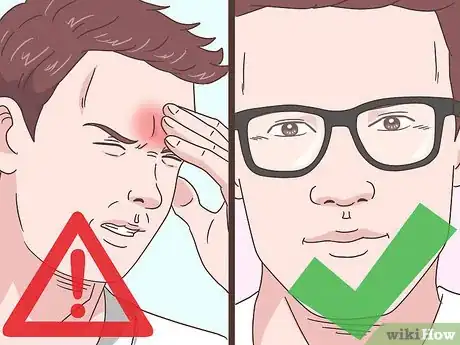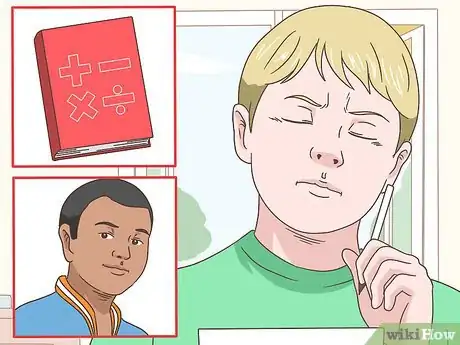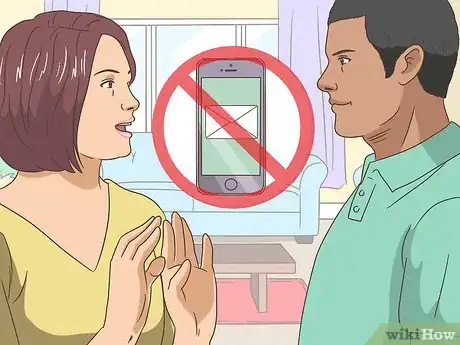This article was co-authored by Tasha Rube, LMSW. Tasha Rube is a Licensed Social Worker based in Kansas City, Kansas. Tasha is affiliated with the Dwight D. Eisenhower VA Medical Center in Leavenworth, Kansas. She received her Masters of Social Work (MSW) from the University of Missouri in 2014.
This article has been viewed 99,852 times.
Facial expressions are key in conveying our emotions, thoughts and feelings to others. A frown typically conveys frustration or anger, but you may have a tendency to frown even when you are not experiencing those emotions. Smiling and laughter may improve your physical and mental health, so this is the best response. Through controlling your facial expressions and monitoring and improving your mood, you can begin to frown less and smile more.
Steps
Controlling Your Facial Expressions
-
1Remind yourself that smiling and laughter is good for body and soul. Smiling more and incorporating laughter into your daily life has a positive impact on your overall well-being. Smiling and laughter is also contagious, so you may be able to influence the moods of those around you.
- Smiling and laughing can also help to decrease stress. When you are smiling and laughing, your stress levels decrease, similar to the way that exercising causes your body to release feel-good chemicals called endorphins.
- When you consciously make an effort to smile and laugh daily, you may become more resilient to life's challenges. Being more resilient in difficult situations can help you to feel happy and be more successful.
-
2Relax your forehead. Perhaps the easiest way to cease frowning so much is to relax your forehead when you feel tension in your face. You can even massage between your two eyebrows using your index and middle finger when you feel your brows furrowing.[1]Advertisement
-
3Consider getting glasses. You may be frowning and furrowing your brows because you are having issues with your sight. This may be forcing you to squint or frown. If you have been having headaches lately, your vision is blurry, or your sight has changed, consider seeing an eye doctor. They will be able to prescribe glasses, contacts or perhaps even Lasik surgery if necessary.[2]
-
4Keep a mirror on your desk. If possible, keep a mirror on your desk at work to monitor your expression and correct it if you see yourself frowning. If you are currently in school and there is a mirror in your classroom, try to situate yourself in sight of it.[3]
- When you are at home, sit near a mirror as well.
- Don't stare at yourself constantly. Look occasionally to ensure that you are not frowning.
- Practice facial expressions in the mirror. Practice smiling and then resting your face. Repeat the process for a few minutes.
-
5Enlist the help of others. Your family and friends can be particularly helpful in assisting you on your quest to stop frowning. Communicate to them this wish and ask them to tell you when you are frowning. Frowning may have become so natural to you that you do not even realize that you are doing it. Since you can't see your face unless you are in front of a mirror, as your friends to let you know when your face develops a scowl.[4]
- You might say to them “Hey, I have noticed that people tell me I frown a lot, but I don't even notice I'm doing it. Can you tell me when you see me frowning so I can learn to stop doing it?”
-
6Place tape on your forehead. When you are at home, and even while you are sleeping, you can train yourself to stop frowning. Take a piece of clear plastic tape and place it between your eyebrows. This will create a barrier on your skin to prevent you from frowning using your eyebrows. You might be frowning during your sleep as well, so this will begin correcting the issue even when you are not awake.[5]
- Try not to put the tape on any of your eyebrow hairs so that you don't cause irritation when you take the tape off.
-
7Smile. Though practicing facial expressions will assist you in your efforts to frown less, sometimes it is necessary to fake it until you make it. Actively encourage and remind yourself to smile throughout your day.[6]
- Smile when you see someone walking past you.
- Smile when someone makes eye contact with you.
-
8Wear sunglasses when outside. On particularly sunny days, you may be forced to squint to protect your eyes from the harmful rays of the sun, which can cause you to frown. However, consider wearing sunglasses to prevent yourself from furrowing your brow.
Monitoring and Improving Your Mood
-
1Assess where the tension comes from. Perhaps a frown is not your natural expression but is instead a symptom of the stress that exists in your life. Throughout your day when you or someone else catches you frowning, assess the stressors that exist in your environment.[7]
- For instance, perhaps you tend to frown when you see a certain person or are given an assignment in a certain class.
- Journal out these stressors to keep track of them and their frequency.
-
2Eliminate or alleviate stress. After determining these stressors, identify which you can get rid of and which you can work to dissipate the effects of. Your frowning can be significantly reduced and perhaps even eradicated completely if you work to get rid of these issues.
- For instance, perhaps your significant other texts you throughout your day about all of the issues they are having at work, causing you stress. Perhaps you can ask them to tell you once you are off work or perhaps during your lunch break so that you don't get distracted.
-
3Write down a list of things you're looking forward to. During the day, when you catch yourself frowning, take a break from your frustration and write down a list of things you are excited about. You can include items that are simple, like having a nice meal after work, or larger things like going on vacation in a week.[8]
- This mini journaling exercise will grant you respite from whatever tension exists and allow you to focus on something that is more positive.
-
4Encourage yourself to laugh. Perhaps one of the best ways to stop frowning so much is to start laughing more! Watch more comedies and throughout your day, you will remember the funny parts and smile more. This is a great way to inject more humour into your life.[9]
- Google jokes or download a joke app to your phone.
- Download or screenshot funny pictures or memes and revisit them throughout your day.
- Spend more time with your funny friends.
-
5Make fun plans to look forward to. If you don't feel that you have many things to look forward to, or even if you do, begin to make some fun plans for yourself or with friends. Consider things like taking a vacation, going to the beach for the day, or going to see a movie that you've been wanting to check out.[10]
- Ask your friends if they have any suggestions.
-
6Take breaks. Sometimes, you might be frowning because you have been working too long or too hard on a difficult project. Remember that you cannot work at your optimal level unless you are taking proper care of yourself, which includes giving yourself space from your work at times. If you find yourself frowning often while completing a task, take a five minute break to listen to a song or to take a walk outside.
- You can also get a snack to revive your spirits.
-
7Address negative comments. You might find that your frowning is eliciting comments from others. People might say things to you like “Wow, you always look so angry.” These comments, especially if they happen often, can be quite annoying and rude. However, you should be prepared to respond to them respectfully yet directly.[11]
- You might say something like “I'm sorry you feel that way, but I am perfectly fine. Thank you for asking.”
-
8Show kindness to others. Another way to improve your mood and stop your frowning is by giving back to others. Whether it's a small act like picking up a coffee for a friend or coworker or something larger like volunteering for a day at a soup kitchen, take some time to show kindness to someone. Giving back is bound to put a smile on your face.[12]
References
- ↑ https://www.psychologytoday.com/blog/prefrontal-nudity/201208/calm-your-face-calm-your-mind
- ↑ http://www.selfgrowth.com/articles/6-ways-to-stop-those-pesky-11-s-between-the-brows
- ↑ http://www.selfgrowth.com/articles/6-ways-to-stop-those-pesky-11-s-between-the-brows
- ↑ http://www.selfgrowth.com/articles/6-ways-to-stop-those-pesky-11-s-between-the-brows
- ↑ http://www.selfgrowth.com/articles/6-ways-to-stop-those-pesky-11-s-between-the-brows
- ↑ http://www.tipsforsuccess.org/happier/
- ↑ http://www.succeedsocially.com/lookangryz
- ↑ http://www.tipsforsuccess.org/happier/
- ↑ http://www.tipsforsuccess.org/happier/
About This Article
It can be hard to stop frowning, especially if you naturally default to that expression, but with a little practice you can better control your facial expressions. It may seem obvious, but try smiling more, which can actually reduce tension and improve your mood. If you notice tension in your face, try relaxing your forehead which will stop your frowning. You can also massage the area between your eyebrows if you feel your brow furrowing. Ask friends and family to point out when you’re frowning, since you may not even notice it happening! To learn how to reduce stress so you frown less, read on!












































































Medical Disclaimer
The content of this article is not intended to be a substitute for professional medical advice, examination, diagnosis, or treatment. You should always contact your doctor or other qualified healthcare professional before starting, changing, or stopping any kind of health treatment.
Read More...